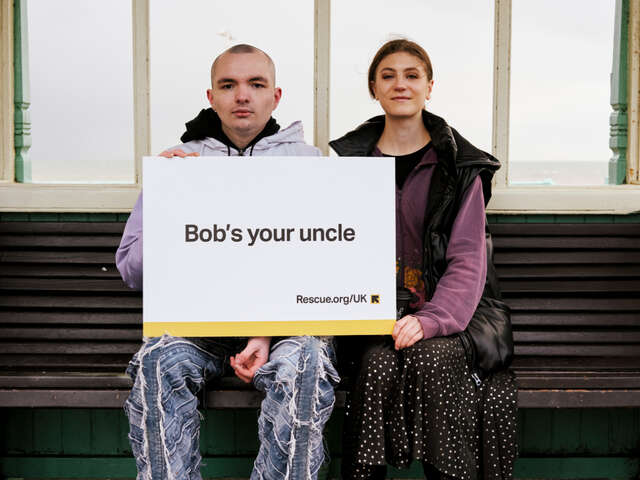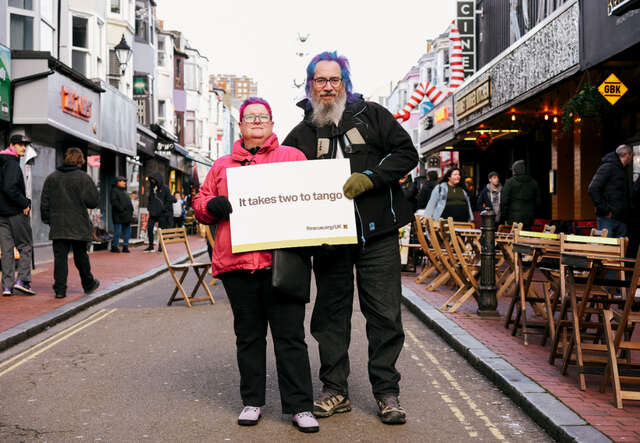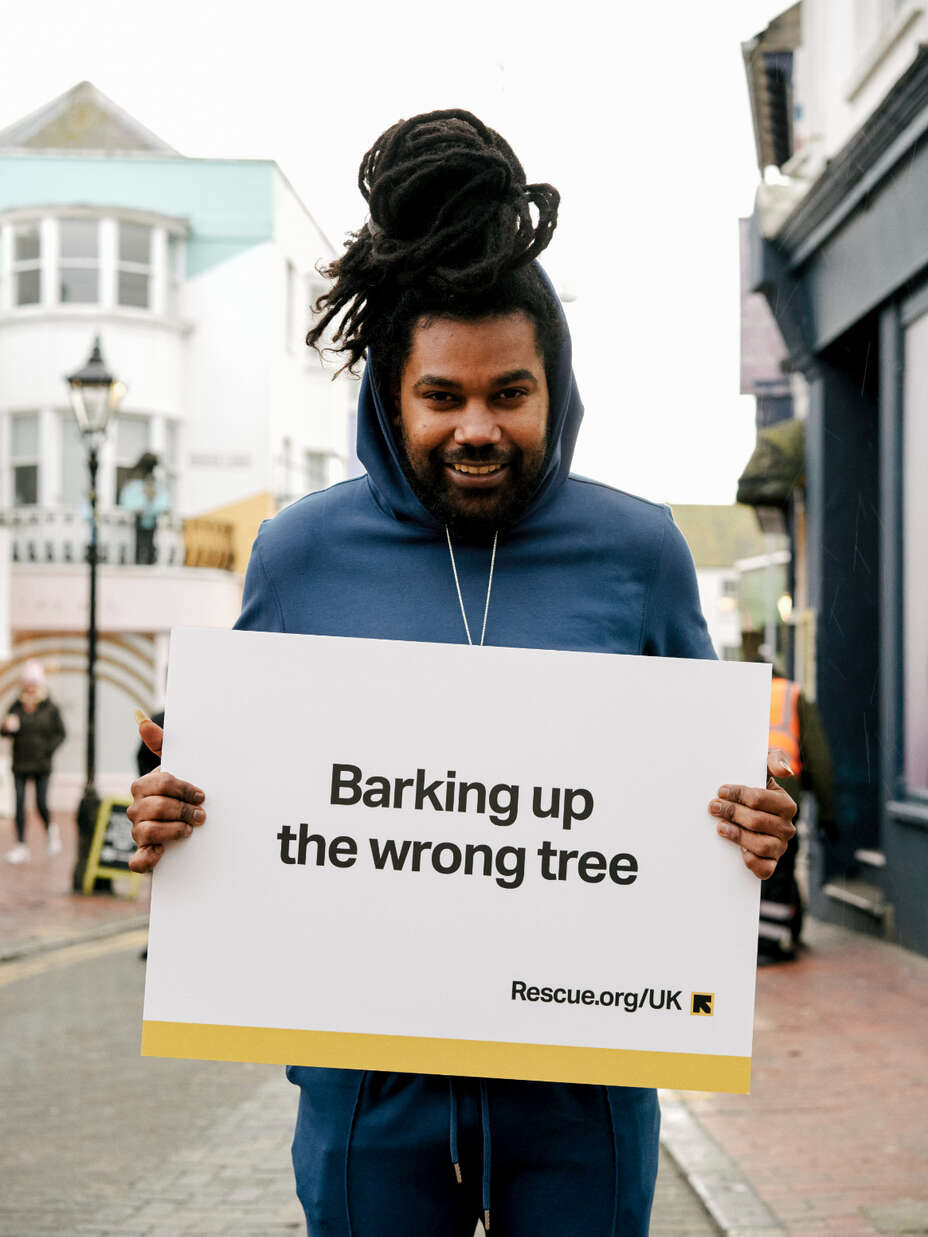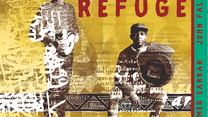
From phrases like ‘Bob’s your uncle’ to ‘swings and roundabouts’, British English is full of sayings and expressions that appear to make little sense.
But for refugees and asylum seekers arriving in the UK, learning English is key when trying to integrate into their new communities and navigate employment and education services.
In a bid to show just how difficult this can be, we took to the streets of Brighton to ask residents if they know what popular British idioms really mean.
So, from ‘elephant in the room’ to ‘cats out of the bag’, how many of these sayings can you explain?

Bob’s your uncle
Meaning: This expression is often used immediately after a set of instructions and means 'it's as simple as that!'
The origins of this phrase aren’t clear, but many believe the expression arose when Conservative Prime Minister Robert Gascoyne-Cecil - known as ‘Bob’ - appointed his nephew Arthur Balfour as Chief Secretary for Ireland in 1887. This nepotism was unpopular at the time.
Swings and roundabouts
Meaning: The Collins online dictionary states that ‘swings and roundabouts’ means: “A situation in which different actions or options result in no eventual gain or loss.”
The phrase itself comes from the idea that at funfairs, the owner might be losing money on one ride, such as the swings, and doing well on another, such as the roundabout.
The elephant in the room
Meaning: This idiom refers to a problem or risk that no one wants to discuss. It is based on the idea that something as large and imposing as an elephant can be overlooked in social interactions.
It is said to date back as early as 1814, when poet Ivan Andreevich Krylov wrote a fable called ‘The Inquisitive Man’ which tells of a man who goes to a museum and notices lots of small things, but fails to notice an elephant.
Throw the baby out with the bathwater
Meaning: According to the Cambridge Dictionary, this means to ‘discard something valuable along with other things that are undesirable.’
It is unclear where this idiom came from, but many believe it derives from a German proverb, das Kind mit dem Bade ausschütten.
Cat’s out the bag
Meaning: According to the Cambridge Dictionary, ‘cat’s out of the bag’ means ‘to allow a secret to be known, usually without intending to’.
The most cited explanation for the phrase dates back to the Middle Ages. It is said that livestock salesmen cheated their buyers by selling them cats instead of pigs. It wasn’t until the buyer arrived home and, literally, let the cat out of the bag that they’d realise they’d been swindled.
It takes two to tango

Meaning: The Cambridge Dictionary states the meaning as ‘both parties involved in a situation or argument are equally responsible for it.’
This expression is said to date back to the 1920s, when the Latin American tango became a very popular dance. It was made popular by singer Pearl Bailey in her 1952 hit song written by Al Hoffman and Dick Manning.
As we discovered, even those who were born in the UK can struggle to explain the precise meanings of these British expressions.
This is why the UK Government must do more to support refugees in learning English so they can rebuild their lives in the UK.
Bits and bobs
Meaning: According to Collins dictionary, bits and bobs is slang for a collection of small items or parts of something.
It reportedly originated from carpenters' tool kits containing parts for a drill, with bits used for making holes, and bobs being routing or screwdriving drill attachments.
Chockablock
Meaning: If a place is ‘chockablock’, it is very full of people or things, according to Cambridge Dictionary.
So if something is full to the brim, it could be described as ‘chockablock.’ To make things more confusing, this is sometimes shortened to ‘chocka.’
According to vocabulary.com, it was originally a nautical word for pulley blocks that were touching each other, which led to its meaning of over-crowded.
Full of beans
Meaning: The Cambridge Dictionary describes ‘full of beans’ as to have a lot of energy and enthusiasm.
So this means someone that's energetic, lively, or enthusiastic might be described as ‘full of beans.’
The Oxford Language Club claims this saying originated in the early 20th century, with beans ‘symbolising vitality and vigour’. They state: “The phrase likely emerged from the idea that beans, being a staple food and a significant source of sustenance, provided essential nutrients and fuel for the body.”

Pear-shaped
Meaning: When a situation goes ‘pear-shaped’, it means it is going badly wrong or awry, according to the Oxford Dictionary.
According to reports, the phrase is old slang from the Royal Air Force and was used to describe awry expeditions and flights.
Spanner in the works
Meaning: Collins Dictionary describes this idiom as ‘to cause problems which prevent something from happening in the way that it was planned.’
As for the origin of the phrase, The Idioms states the origin could possibly relate to the Luddites who were a group of textile workers in the 1800s who purposely destroyed weaving machines as a form of protest.
Apparently, the Luddites were worried that automated machines could take over their jobs so they were known to throw spanners in ‘the works’ in order to damage the machines.
The bee’s knees
Meaning: This is usually a phrase used to describe something or someone who is ‘excellent or of an extremely high standard’, according to Cambridge Dictionary.
The origin of this phrase is unclear, but BBC Wildlife have suggested it might be a reference to 1920s dancer Bee Jackson's incredibly quick moving knees when she popularised the Charleston, or a reference to the pollen load carried on a bee's back legs.
Supporting refugees
As wediscovered, even those who were born in the UK can struggle to explain the precise meanings of these British expressions.
This is why the UK Government must do more to support refugees in learning English so they can rebuild their lives in the UK.
What is the International Rescue Committee?
The International Rescue Committee responds to the world's worst humanitarian crises, including the conflict in Ukraine and the crisis in Afghanistan. We help to restore health, safety, education, economic wellbeing and power to people devastated by conflict and disaster. And we are proud to fight for a world where women and girls have an equal chance to succeed.



